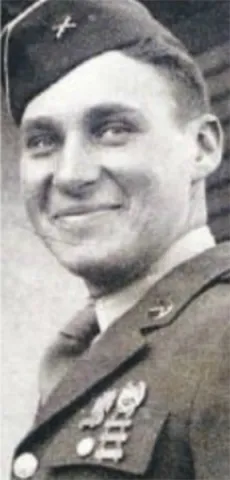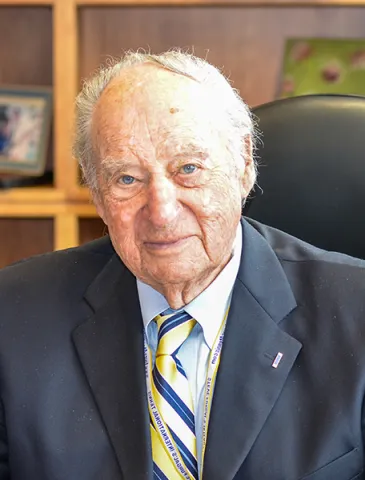
Leonard D. Wexler served as a private in the U.S. Army from 1943-1945.
In this interview, U.S. District Judge Leonard D. Wexler of the Eastern District of New York recounts his World War II combat experience and subsequent judicial career. Judge Wexler, who sits in Central Islip, N.Y., served as a private in the U.S. Army from 1943-1945.
WWII Highlights:
- Landed in France in late August or early September 1944, with an anti-tank unit.
- Was wounded by shrapnel days before the start of the Battle of the Bulge.
- Received two Bronze Stars and a Purple Heart.
Transcript
Q. Tell me about your life before the war. Did you have any clear plans for the future?
A. I was born and raised in Brooklyn and was going to high school when the war started . … I was not a good student. I was not interested in many things, only in sports. I was a good athlete… So, I had no background or intention of going to college at all.
Q. How did you enter the Army?
A. I was drafted while I was still in high school. In those days they let you graduate high school, and one week after graduation you reported for duty … I was sent to infantry basic training in Texas. There, we took tests, IQ tests and so forth, to see whether you were qualified to go to college under a program. It was called ASTPA. And that was specialized training to become an engineer. I passed that test, barely, and I went to University of Cincinnati for six months.
When they broke up the entire program throughout the country, I volunteered for the paratroopers, but they told me I was already assigned to join a tank destroyer outfit that was going overseas. … So I became a tank destroyer who had never seen a tank in his life. I was a machine gunner. I’d never seen a machine gun in my life, but that was what I went over as, the extra man for this tank destroyer outfit. … Why, how, or when, I will never know. You never know anything. Remember, my rank was always buck private. I was the lowest. I got to France in late August or September 1944.
I was scared. I was frightened. You don’t know where the tanks are coming from. You know tanks are coming. That is the reason you get called up. You move your gun into position. You normally get behind a tree or behind a bush or something, so you are protected to some degree, and you wait for the tanks to come.

Leonard D. Wexler served as a private in the U.S. Army from 1943-1945.
It’s survival time. You grew up in a mighty quick way. I think everyone who went through the war, whether combat or not, you grew up.
—Judge Wexler
A. Well, you’re cold, you’re hungry, you’re frightened, you’re dirty. You’re wearing the same clothes for a month without changing. You don’t get a decent meal. In the wintertime, you get canned food, and the top layer is always frozen and you have to use your bayonet to take the ice off it. You don’t know where you are. You don’t know where you are going. It’s pretty miserable.
Q. Tell me about your wound.
A. We were behind the frontlines. Again, we always stayed behind the frontlines until there was a call from the infantry to move up and get in position. I was in a foxhole and bombs were bursting around, but that was usual. … There was snow all around, and all of a sudden, one foot feels nice and warm. It was delightful! Of course, I looked down and I’m standing in a puddle of blood. I’d just been hit with shrapnel in my legs, in my left leg. I don’t even know how I ended up in a hospital that we captured in Germany. I guess I collapsed or was unconscious because I don’t know how I got there. Not only was I hit with shrapnel, I had trench foot in both feet.
Q. Why do you consider this to be a lucky event?
A. Because we were right in the middle of the area of the German breakthrough, the Battle of the Bulge. We lost more men in that offensive than we did in D-Day. The Battle of the Bulge occurred on December 15th. I was hit on December 12th. … Why was I lucky? Imagine being entrenched in an unmovable position with German tanks coming at you and nowhere to get the hell out. I think almost my whole outfit was wiped out. So I was very lucky and thankful that I got hit. It saved my life.
Q. Did you learn any lasting lessons from the war?
A. Well, I think I grew up. I became serious. I didn’t want to be a buck private anymore and I didn’t want to have alphabetically, everything in the army is ranked alphabetically. I was always at the end. I was tired of being at the end, not knowing what’s going on. I figured I have to change my way. I grew up.
College was fun. I loved it. It was a big honor. I was learning and I was doing well in school. I never did well in school. Now, with being mature and knowing and understanding what I really wanted to accomplish with my life, it changed. …I enjoyed what I was doing. I loved learning. I didn’t care about sports anymore. I became a student, and it changed my life.
Q. Tell me briefly about your legal career.
A. Well, I graduated from NYU Law School and they had an employment bureau. I was a Brooklyn kid and I didn’t want to work in the city. I got hired in Suffolk County. I never wanted to be a trial lawyer. I never took a course in trial technique or moot court. And what’s my first job? They’re sending me out to try minor cases. I had no idea I was going to be doing that, nor did I want it. PS, I loved it. I become a litigator ,and when I say a litigator, I was on trial almost every day of my life from there on in, and I loved every moment of it.
Q. When you were offered a federal judgeship, what were your thoughts?
A. I had no idea I wanted to be judge, never thought of it, never wanted it. When asked if I wanted a federal judgeship, I said, “Well, I have to talk to my wife first.” I went home and told my wife they are offering me a federal judgeship. I’m now about 59 years old and she says, “What does that mean?” I said, “Well it’s a lifetime appointment.” She said, “Take it.” So I said okay, I’ll go for it.
But I never wanted to be a judge. It’s life. It’s amazing at how things happen without you expecting them, and you just got to go with the flow. I teach at law school now, and I tell them you got to go with the flow. You may be hurt at the beginning, but it’s not the end. Don’t quit. Life has its crazy turns. You don’t know what it’s going to lead to.
Q. How many days a week do you work now?
A. Five days a week. I believe I try more cases than anybody else. I teach on the side, and I love it all. I love what I’m doing. I have no hobbies. I used to sail, but I’m too old to sail, so I have no tennis, no golf. I just love doing what I’m doing. I look forward to working.
Q. The Eastern District of New York still has five World War II veterans. Do you still think of yourselves as having a special bond?
A. Yes we do. It’s a brotherhood. We all consider ourselves as part of the brotherhood. We’re different. We went through an experience which is unique. I am sure that those in the wars that followed will do the same thing if they’re in the same professions. They’ll talk about it. They’ll be involved. Even though we may disagree philosophically or on the law, but we still consider ourselves brothers. It is a brotherhood.
Q. Do you like the phrase “the Greatest generation”?
A. Yes, I like it. I think it fits. We were the greatest generation. I mean, everybody was united. Everybody stood together. I’ll give you an example. When I got home and I would take the train, a Brooklyn kid, I had a cane, everybody would stand up to give me a seat. Everybody was so nice. I really felt good that we were a great country at one time, united.
Subscribe to News Updates
Subscribe to be notified when the news section is updated.
